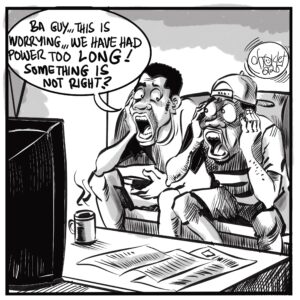KENYAN Professor of Law Patrick Loch Otieno Lumumba says President Edgar Lungu must consider leaving office with dignity at the end of his current term so that he can join other former African heads of state who are leading the continent in other capacities. Prof Lumumba contends that there are many things one can do after leaving the Presidency.
“President Lungu is a lawyer. He knows that his arguments are lame. His argument that he inherited a presidency and, therefore, that he is eligible again is without basis. He has not served Zambia well, he knows it. What is he going to do in his third term, even if he gets it? He should leave the stage and do so in dignity. There are a lot of things to be done when he leaves office, let him ask many presidents who have retired. Let him ask president Olusegun Obasanjo; let him ask president Jakaya Mrisho Kikwete; let him ask president Joachim Chissano; let him ask Festus Mogae; let him ask Thabo Mbeki. There are beautiful things he can do after leaving office in dignity, he can form Edgar Lungu Foundation,” Prof Lumumba said.
We agree with him on that point. In fact, we have offered the same advice to President Edgar Lungu on various occasions in the past, and we have since arrived at the conclusion that our Kateka has other fears about leaving office, rather than just losing power. But what our Kenyan brother is saying has a lot of wisdom.
Mr Rupiah Banda was not the best president we ever had. He had flaws, many of them. But one single gesture of accepting electoral defeat and democratically handing over power to an opposition leader has earned him so much global accolade. Mr Banda is now a busy man; where there is electoral conflict on the continent, the African Union, European Union, the United Nations, not to mention SADC, all look to him as a peacemaker.
Mr Banda left power with dignity and the world is rewarding him with the respect he deserves. What Prof Lumumba is asking President Lungu to do is to create his own legacy of upholding democracy by letting other people in his party to lead. He must do the honourable thing and drop the third term bid.
If we may ask again: how does he want the people of Zambia to remember him? In 2016, he assented to the Constitution amendments that the people were asking for, but now he wants to reverse those gains by manipulating the Constitution in his favour, why? By 2021, our President will have served seven years. What is so difficult about passing on the mantle of leadership to someone else? Is he saying there is no one else in PF who can lead the party apart from himself? How does he want Zambians, both inside and outside PF, to remember him?
Our President thinks the people of Zambia still want him to remain in office because he is surrounded by people who have made him believe so. But President Lungu must ask himself: if he lost power today, what would be left of him? Will people respect him and treat him with the dignity deserving of a former head of State? What is the symbol of the Edgar Lungu Presidency? Is it corruption? Closing down media houses? The depreciating kwacha? Or maybe load shedding and the unprecedented fuel prices? What exactly will Zambians remember President Lungu for?
Prof Lumumba says the other reason why Zambians must remove the Patriotic Front from power is the fact that the President has embraced corruption. He says the whole continent knows that our Head of State is not committed to the fight against corruption because he allows Ministers who are arrested for graft to stay in office.
“Your President is not interested in the fight against corruption. We know it, he is not interested in the fight against corruption. If you have Cabinet Ministers who are engaged in corruption and an anti-corruption authority investigates them and they are found to be culpable, then they ought to be taken to court. If you then interpret that as a regime change, then that regime ought to be changed. A corrupt regime needs to be changed,” he said.
Again, we agree with Prof Lumumba. The amount of money that Zambia is losing to corruption is enough to finance another small African country’s national budget. It’s just too much! Like we have suggested before, it appears that the Head of State is reluctant to genuinely fight corruption because he is a beneficiary.
We also believe that some of the corruption that happens in his name, through government tenders and smuggling of natural resources, happens with his blessings. This is, indeed, a good ground for the people to seek regime change.
























